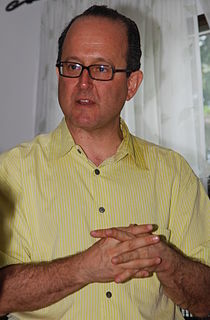A Quote by Paul Laffoley
To have that radical a mind in that bourgeois-looking body was really hard for a lot of people to take, because, when my mother would want to have people over she'd tell [my father], "Don't start with the gravity stuff." And then he would invariably do this and the guests would look at each other and say, "Well, I think it's time to go now."
Related Quotes
Maybe they would look at each other and feel some odd yearning, but neither of them would know why. They would want to stop, but they would be embarrassed, and neither would know what to say. They would go their separate ways. Who knew? Maybe that happened every day to people who'd once loved each other.
When I went to Stan Lee - every time I was with Stan, I learned something every day. When I would do a pencil job, if I didn't have much faith in it I would hand it in and invariably Stan would make it look like it was a well-written and well-planned-out story. It made me tell people, 'If you want to become an artist, go to work at Marvel. Stan will turn you into a storyteller.'
I think, when I started to become successful in the movie business, my mother was very, very worried. She thought no one would want to marry me and she thought that was the most important thing. And she thought that it would affect my personal relations. And she said how worried she was that people would take advantage of me or I would meet the wrong people. When I was made head of the studio, one of her first things was, "Well, now no one will marry you. I hope you'll be happy, whatever."
If my mom came here today, she'd probably join this red-hat brigade. My mother got my sense of humor, even when I was a kid. I would just do things that tickled my fancy in the moment, and she would ask me who I was entertaining. I'd say, 'Well, me.' And she would tell me that nobody knew that and they thought I was psychotic. Well, I don't ever want people to think I'm psychotic, but I can't help myself from doing these things.
So we [with Kate DiCamillo] would act them out, we would toss ideas back and forth, we would laugh, we would argue. Sometimes it went really well, sometimes it was such a pain in the ass. Our other rule was that we wouldn't work on it at all when we weren't in the other's presence. It was really hard not to do that. We'd start going on email back and forth, 'What do you think about this, what do you think about that?' But, no, no, no, it had to be live. So we forced ourselves not to look at it except during those two-hour stretches when we were actually with each other.
What do you want in your life? What do you want in your relationships? And if you say, I'd like them to be harmonious; I'd like them to be free; I'd like not to be in a state of blame all the time or shame. If you answer like that, then I would say, look at what's unforgiven. Look at where you know you did wrong and you would like to go to that person and say - I'm sorry. Can we start over? If you want to have a happier life, I would say, practice forgiveness.
I would say [to my father], "Why don't you actually take some courses in physics instead of saying [you are not believing in gravity]?" But he would never do it. Businessmen for some reason or other, think, because they're successful in a single direction, that they know everything. You know what I mean? You ever meet people like that?
Throughout my career, I had a lot of mentors, and I just adopted them. What I found is that, especially if you're young, when you go up to people and say, 'Would you mind being my mentor?,' their eyes widen. They literally step back. What they're thinking about is the commitment and time involved if they say yes. And time is something they don't have. So I would not ask them to be my mentor, but I would just start treating them like it. And that worked very well for me.
I used to go into pubs and people would want to pick a fight with me. I would hear a group of girls say: 'Oh look, there's Pat Cash.' And then one of them would come up to me and say, 'You think you're so good,' and throw a drink in my face. That kind of reaction from people was a bit of a shock initially, and you don't ever really get used to it.
My mother was a Bible student, and when I was a youngster, both my mother and father would say, 'If people would only live by the Golden Rule, there wouldn't be the problems that there are.' In other words, 'treat people the way you want to be treated.' If somebody mistreats you, two wrongs won't make a right.
I would say that the people, largely, who I met were Democrats. But really it's what - people want to change the country. They think that the Democratic Party is the vehicle. But let's face it, if the Democratic Party does not respond and Hillary Clinton does then not go forth and implement the things she supports now if she's elected president, the Democratic Party will lose a lot of people.
I get very close to people when I'm shooting them. We would go and shoot a scene with Lucy, and I would spend the whole time telling her about Rob. Then I would go shoot a scene with Rob and tell him all about Lucy. Eventually they wanted to know each other. These are two people who would never have overlapped in any other way or context. We brought to the garden at Rob's office and just sat and watched what unfolded. I remember weeping behind the camera, because I was so moved by the way they connected.
































